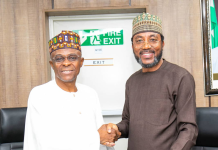John Iwori
Nigeria’s fiscal policies, especially its tax regime are skewed against indigenous ship owners, the President, Ship Owners Association of Nigeria (SOAN), Mr. Greg Ogbeifun has said.
Ogbeifun, a marine engineer argued that the unfavourable fiscal policies have made it difficult for indigenous ship owners to procure new vessels or maintain old ones.
The SOAN President who spoke on the side line of the just concluded 2018 Lagos International Maritime Week at the Oriental Hotel, Lekki, Lagos, frowned at the current Nigerian fiscal policy which stipulates that a vessel owner bringing ship into the country should first pay a duty charge of 14 percent of the total cost of the vessel to the Nigeria Customs Service (NCS).
He pointed out that this was not the case in other developed maritime nations. The ship owner maintained that the reverse was actually the case in those countries.
His words: “The PIL pulled out of Nigeria because the Nigerian fiscal policy does not make an establishment where fleet of that nature will be competitive in global trade. The fiscal policies are tax laws, tonnage tax laws, and other laws that affect international shipping. We had to, as a body, appoint a company as consultant to do an international study of what other countries and rulers create. The whole idea was that we wanted to know what they did to be able to establish fleets that are trading globally. That study revealed that most of those countries first of all declared zero duty.
“If you are national and you acquire a vessel and you are bringing that vessel into the country, your duty is zero; but in this country, the duty payable on an average if you are bringing in a vessel is about 14 percent of the value of that vessel. So if you take a vessel of $80 million of crude oil tanker, you will not only pay for the cost of the vessel which is $80 million but you also have to pay another 14 percent of that to be able to import it into your country because you are flying your flag, and you are going to be competing with other foreign countries who are carrying your cargo and who did not have to pay such duty in their country.
“The 14 percent is besides other payments that you have to pay to Nigeria Customs Service, Nigeria Ports Authority (NPA) and so on when you are bringing in the vessel into the country. At the end of the day, their commercial terms for carrying the cargo will be cheaper than yours, so you cannot be competitive internationally. That is just an example of why PIL said in their writing that Nigeria must review the fiscal policy if they must continue in that relationship”.
Ogbeifun who is also the Chairman and chief executive officer of Starzs Investments Company Limited enjoined the authorities to create what he called “a more enabling environment” that would not only ensure a level playing field, but also empower the nation’s operators in the shipping sector, the ability to compete, unhindered.
He also identified the major challenges indigenous vessels owners face in Nigeria unlike their foreign counterparts.
These include breakdown maintenance costs which have to be solve through hard-to-get foreign currency.
To address the dwindling fortunes in the maritime industry, the ship owner called on the Federal Government to encourage Nigerians to acquire more vessels.
He argued that the acquisition of more vessels was one of the veritable ways to address the challenge of rising unemployment of seafarers in the maritime industry.
The 2018 Lagos International Maritime Week with the theme “Armed Guards Aboard Merchant Vessels in Nigeria-Legal or Illegal” attracted several players in and outside the maritime industry.











